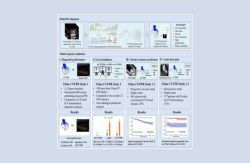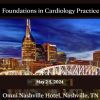Dr. Elena Arbelo, a cardiologist at the Clinic Hospital in Barcelona and a member of the Spanish Society of Cardiology (SEC), has led the development and presentation of guidelines for the management of cardiomyopathies at the European Society of Cardiology (ESC) Congress, held in Amsterdam from August 25th to 28th. This is a pioneering document for all cardiologists, providing a set of recommendations to optimize the diagnosis and management of patients with cardiomyopathies. The creation of these guidelines also involved three other Spanish cardiologists (Juan Ramón Gimeno, Pablo García Pavía, and Roberto Barriales). This text is groundbreaking as it is the first time that it encompasses all types of cardiomyopathies.
Cardiomyopathies are a group of diseases affecting the heart muscle's ability to pump blood, which can lead to abnormal heart rhythms and even heart failure. They often result from changes in genes responsible for the functioning of heart muscle cells, making these diseases potentially hereditary. Cardiomyopathies can manifest at any age.
In Spain, it's estimated that around one in every 300 to 400 people suffers from some type of cardiomyopathy, with hypertrophic cardiomyopathy (HCM) being the most prevalent. HCM affects one out of every 500 Spaniards and leads to an average of three to five new consultations per week in general hospitals.
The risks and complications of cardiomyopathies vary. While many patients exhibit few symptoms, others experience fatigue, difficulty breathing, chest pain, palpitations, and fainting, along with more severe complications such as heart attacks or sudden death.
As Dr. Elena Arbelo explains, "It's a pioneering document that reflects advancements in genetics and cardiac imaging, as well as the introduction of new treatments targeting the specific causes of these diseases."
Imaging Techniques and Genetic Counseling
The recommendations highlight numerous areas of shared diagnosis and treatment among different subtypes of cardiomyopathy, providing specific recommendations for each. Diagnosis begins with describing how the heart looks and behaves, and then incorporates information about cardiac rhythm abnormalities, family history, and genetic tests to achieve a more precise diagnosis. "Imaging techniques such as echocardiography and cardiac magnetic resonance are essential for diagnosing certain subtypes and can help identify patients at risk of sudden death," says Dr. Arbelo.
Diagnosing hereditary cardiomyopathy can lead to exclusion from competitive sports and influence decisions about having children. Some patients must live with a small risk of sudden death or the possibility of a future heart transplant, so in some cases, the use of an implantable automatic defibrillator (AID) may be recommended to prevent this complication.
The guidelines also recommend genetic counseling to help patients and their families understand and adapt to the diagnosis of a genetic disease. This should be offered before deciding to undergo testing and when results are delivered to the patient and their family. Clinical psychological support should also be provided to all patients who have received an AID implant or who have a family history of sudden cardiac death.
For all cardiomyopathies, the treatment aims to identify and manage symptoms, prevent complications, and assess at-risk family members. An important goal of these guidelines is to identify individuals at higher risk of sudden death. Shared decision-making is recommended when selecting certain treatments such as AIDs. Other treatments include medications to address symptoms and heart transplantation.
Advice for Patients with Cardiomyopathies
The guidelines also feature a specific section providing advice for patients on living with cardiomyopathy, covering exercise, diet, alcohol consumption, weight, reproductive issues, sexual activity, medication, vaccination, driving, employment, holidays, travel insurance, and life insurance.
It's important to note that cardiomyopathies are the leading cause of exercise-related sudden cardiac death in young individuals in the Western world. In some cardiomyopathies, exercise accelerates disease progression, historically leading to recommendations for all patients to limit activity. Many patients have restricted themselves to a relatively sedentary lifestyle due to fear of sudden cardiac death, thereby missing out on the beneficial effects of exercise in preventing cardiovascular diseases.
However, these guidelines recommend regular low-to-moderate-intensity exercise for all patients with cardiomyopathy who are able to engage in it. An individualized risk assessment should be performed to provide an exercise prescription that considers preventing potentially deadly arrhythmias during exercise, treating symptoms to enable sports participation, and preventing exercise-induced disease progression. Patients with certain cardiomyopathies should avoid competitive or high-intensity sports.
Furthermore, the guidelines recommend a multidisciplinary approach to patient care, along with timely and appropriate preparation for transitioning from pediatric cardiomyopathy services to adult services. They emphasize the need for integrated care between cardiomyopathy specialist teams and other professionals, including cardiologists, geneticists, genetic counselors, pathologists, and other specialties, as well as close interactions between primary, secondary, and tertiary care.
The SEC Brings You to ESC23
The Spanish Society of Cardiology (SEC) has provided comprehensive coverage of the congress through the project 'La SEC te lleva a ESC23', coordinated by Dr. Manuel Anguita and Dr. Almudena Castro.
During the four days of the international congress, a team of young cardiologists will provide real-time updates through express presentations, covering the latest developments, from Late-Breaking Clinical Trials to the most surprising or innovative works, as well as those with the greatest impact on clinical practice.
Following the congress, there will be a period for analysis, discussion, and critical commentary in an online livestream event that will take place at the Heart House on Tuesday, August 29th, at 5:00 PM.
Source: Spanish Society of Cardiology (SEC)























